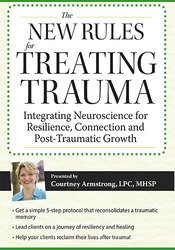

Were you taught to use medication, CBT, exposure and other traditional therapy approaches to treat trauma? Did you know that these approaches can be limited when it comes to healing trauma at the deeper, emotional level of the brain?
Memory reconsolidation is a recent neuroscience breakthrough that revealed a new way to clear trauma at its roots by process of recalling and updating a memory.
During this recording, I'll provide you with step-by-step instructions and techniques you can use in each phase of trauma treatment. This is the trauma training that specifically gives you skills in the phenomena of memory reconsolidation. Let me show you why memory reconsolidation is necessary for transforming your trauma work with clients. I will give you a simple protocol to use to reconsolidate a traumatic memory in as little as one session!
Don't get the impression that you have to get lengthy, expensive training and certification in certain modalities in order to be able to successfully treat trauma. This recording will let you walk away knowing exactly what to do to help your clients reclaim their lives after trauma!
Courtney Armstrong, LPC, MHSP

Courtney Armstrong, LPC-MHSP, is a licensed professional counselor who specializes in grief and trauma recovery with over 25 years’ experience. Certified as an approved consultant by the American Society of Clinical Hypnosis (ASCH), she is the founder of the Institute for Trauma Informed Hypnotherapy and has developed clinical hypnosis training programs for the Veterans Administration, serves on the ASCH Education and Training committee, and has trained thousands of clinicians worldwide.
Courtney is also bestselling author of the books, Rethinking Trauma Treatment: Attachment, Memory Reconsolidation, and Resilience, The Therapeutic “Aha”, and Transforming Traumatic Grief. She has been featured as a trauma and grief expert on national television and radio programs and contributes to publications such as Psychotherapy Networker, Counseling Today, and The Science of Psychotherapy.
Speaker Disclosures:
Financial: Courtney Armstrong is the founder and president of Courtney Armstrong Consulting and Training Services and the Institute for Trauma Informed Hypnotherapy. She receives a speaking honorarium and recording royalties from PESI, Inc. She has no relevant financial relationships with ineligible organizations.
Non-financial: Courtney Armstrong serves on the Clinical Hypnosis Education and Training Committee of the American Society for Clinical Hypnosis. She is a member of the American Mental Health Counselor's Association, the Tennessee Licensed Professional Counselors Association, and the Chattanooga Area Psychotherapy Association.
Please wait ...